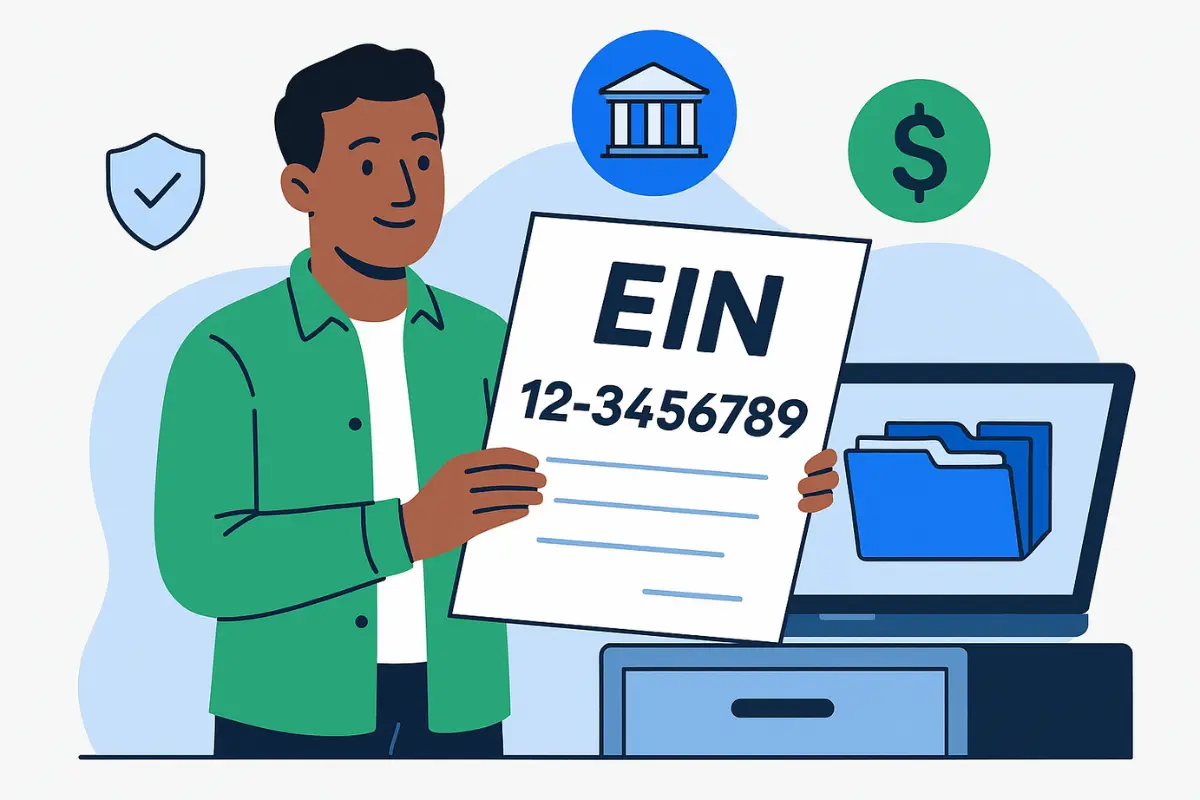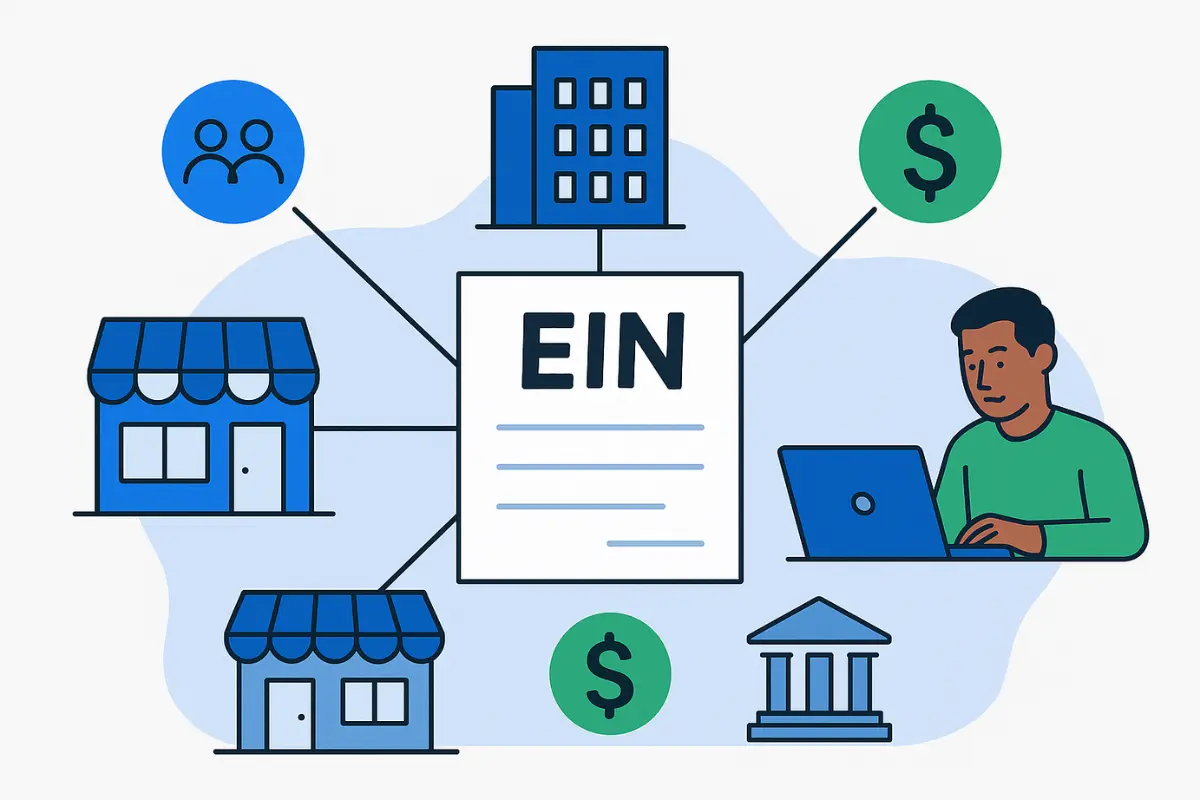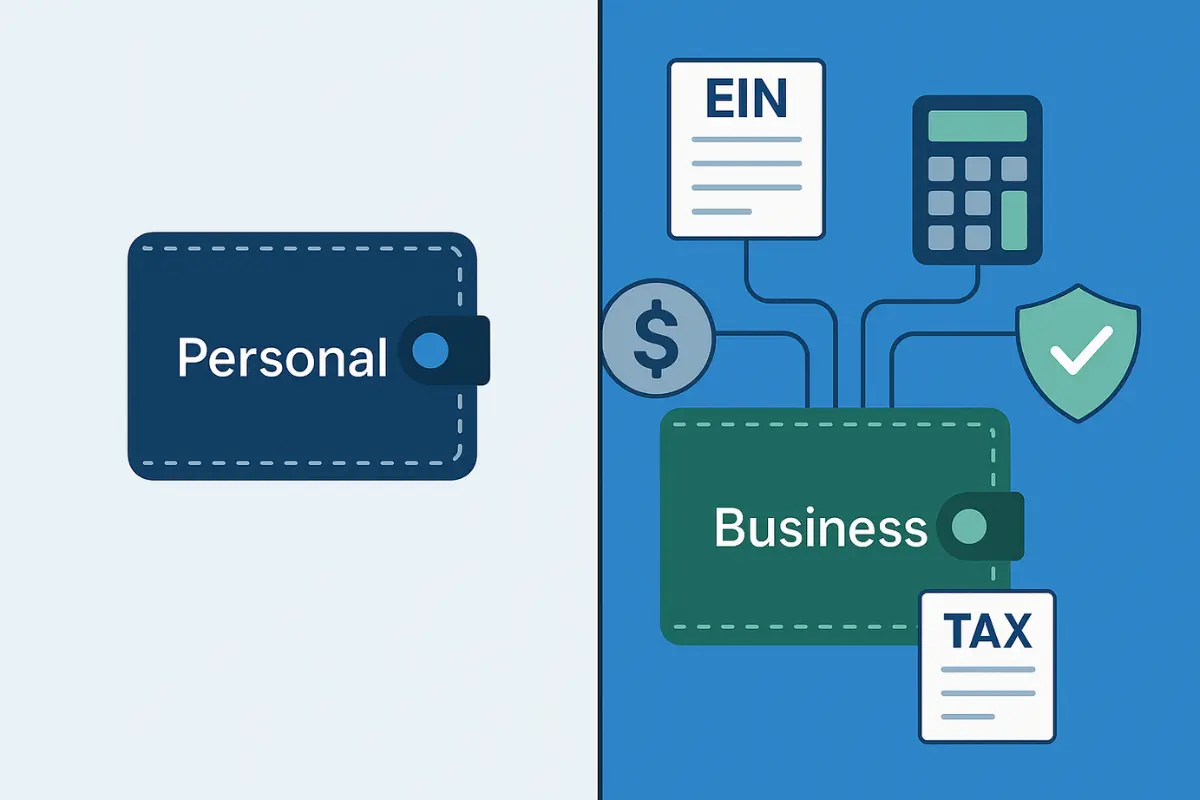EIN Number FAQs: What It Is, How to Get It, Why It Matters

Launching a business is exciting, but without an Employer Identification Number (EIN), your company could hit major roadblocks before it ever gets off the ground. For entrepreneurs and business owners, obtaining an Employer Identification Number (EIN Number) is that critical first step. Also known as a Federal Tax ID, or Employer Tax ID, this unique nine-digit Business Tax Identification Number designates your business entity for tax purposes. An EIN is to a business what a Social Security Number is to an individual, It’s the government-issued number that officially registers and tracks your business for tax and regulatory purposes. Without it, your business cannot legally hire employees, open a dedicated business bank account, or build its own credit profile.
This isn't just a formality; it's a fundamental pillar of legitimate business operations. This guide walks you through everything you need to know about EINs, providing a clear roadmap to understanding what an EIN is, who needs one, how to get it, and why it is non-negotiable for your business's success and security.

Key Takeaways
-
Separates and Protects: It legally separates your personal and business finances, which is crucial for Limited Liability Companies (LLCs) and sole proprietors seeking to protect personal assets from business liabilities.
-
Unlocks Business Functions: An EIN is required to hire employees, open a business bank account, build business credit, apply for business licenses, and file most tax forms.
-
Guards Against Identity Theft: Using an EIN instead of your personal SSN on business documents significantly reduces your risk of identity theft.
-
Application is Straightforward: The fastest way to get your EIN is via the IRS EIN Application online, which provides your number immediately after validation.
What Is an EIN?
An Employer Identification Number (EIN) is a unique nine-digit number assigned by the Internal Revenue Service (IRS) to identify a business entity operating in the United States. Think of it as a Social Security Number for your business.
The primary purpose of an EIN is to facilitate the administration of tax laws. As a taxpayer ID number, the Federal Tax ID is used for federal income tax reporting and can also be required for state tax purposes. Businesses use this Tax Identification Number to file tax returns, make tax payments, and communicate with the IRS about any tax matters. As defined by Investopedia, an EIN is "a unique nine-digit number assigned by the Internal Revenue Service (IRS) to business entities operating in the United States for the purposes of identification."
Beyond taxes, this business registration number is indispensable for opening business bank accounts, applying for loans and credit lines, hiring employees, and establishing credibility with vendors and partners.
Who Needs an EIN?
Not every business is legally required to have an EIN, but the vast majority will need one to operate properly and access essential services. The IRS mandates an EIN for the following entities and situations:
Corporations and Partnerships
All corporations and partnerships (including LLCs taxed as corporations) are legally required to obtain an EIN. This is non-negotiable for Federal Tax ID reporting, opening business bank accounts, and maintaining corporate compliance.
Limited Liability Companies (LLCs)
Any Limited Liability Company (LLC) with more than one member (multi-member LLC) must have an EIN. Single-member LLCs need an EIN if they have employees or are taxed as a corporation. Even if not required, obtaining a Tax ID for LLC is a best practice to separate personal and business finances.
Nonprofit Organizations
A nonprofit organization must obtain an EIN to apply for 501(c)(3) tax-exempt status with the IRS and to ensure compliance with legal requirements for establishing and operating the organization. This number is also required to receive tax-deductible donations and open a nonprofit bank account.
Estates and Trusts
Estates of deceased individuals that generate income and certain types of trusts (e.g., grantor trusts) need an EIN to report income and manage tax obligations separately from the individuals involved.
Sole Proprietors With Employees
Sole proprietors who do not have employees can use their SSN for business taxes. However, the moment you hire even one employee, you are required by law to obtain an EIN for payroll tax reporting.
Businesses Filing Certain Tax Returns
Businesses that file excise, alcohol, tobacco, or firearms tax returns are required to have an EIN, regardless of whether they have employees.
Businesses Withholding Taxes on Non-Resident Aliens
Any business that makes payments to non-resident aliens for services performed in the U.S. must have an EIN to report and remit withholding taxes to the IRS.

How to Apply for an EIN
Obtaining your EIN is a straightforward process managed directly by the Internal Revenue Service, as noted in a comprehensive guide by Forbes Advisor. You can apply directly through the IRS at no cost, or work with professional filing services like InCorp to ensure accuracy and save time. The quickest and most efficient method is to apply online.
Step 1 – Determine Your Eligibility
The applicant must be an individual with a valid Social Security Number (SSN) or an existing Individual Taxpayer Identification Number (ITIN). The business must also have a legal physical address in the United States or its territories.
Step 2 – Gather Required Information
Before starting your application, have this information ready:
-
Legal name of the business entity
-
Trade name or "Doing Business As" (DBA) name, if applicable
-
Business entity type (e.g., LLC, Corporation, Sole Proprietorship)
-
Name and SSN/ITIN of the "responsible party" (the person who controls the entity)
-
Business mailing address
-
The reason for applying (e.g., started a new business, hired employees)
Step 3 – Choose Your Application Method
You have four options, but online is strongly recommended:
-
Online (IRS Website): The fastest method. The system validates your information in real-time, and you receive your EIN immediately upon completion.
-
Fax: Complete Form SS-4 and fax it to the IRS. Processing time is typically within four business days.
-
Mail: Mail the completed Form SS-4 to the IRS. This has the longest processing time, taking approximately four weeks.
-
Phone (International Applicants Only): Available for applicants outside the U.S.
Step 4 – Complete IRS Form SS-4
Whether applying online or by form, you will need to provide the information gathered in Step 2. Accuracy is critical; ensure all details, especially the legal name and responsible party information, are correct to avoid delays.
Step 5 – Submit Your Application
Follow the instructions for your chosen method. Online applicants will complete a digital interview format. If applying by fax or mail, double-check that the Form SS-4 is filled out completely and legibly.
Step 6 – Receive Your EIN
-
Online: Receive your EIN confirmation notice (Letter CP-575) digitally immediately. Download and save this PDF.
-
Fax/Mail: You will receive your EIN and confirmation notice via the method you used to apply.
Save your EIN confirmation notice in a secure location, as you will need it for tax filings, banking, and other official business registration number administration tasks.
Why an EIN Matters
An EIN is a unique federal tax ID issued by the IRS to eligible businesses. While it’s not required for every business—such as sole proprietors without employees—it is essential when hiring employees, forming partnerships or corporations, complying with various IRS rules, or engaging in specific regulated activities.
Separate Personal and Business Finances
An EIN is one of the primary tools that enables a business to establish its separate identity, especially when opening business bank accounts and applying for credit. However, simply obtaining an EIN does not automatically separate your finances. True separation is achieved through key ongoing actions: opening and consistently using dedicated business accounts, maintaining accurate bookkeeping, and strictly avoiding the mixing of personal and business transactions.
This separation is vital for accurate bookkeeping, simplifies tax filing, and is essential to preserving the liability protection afforded by entities like LLCs and corporations—since commingling finances can undermine these legal protections. Maintaining clear boundaries is critical not just for compliance, but for protecting personal assets and supporting the long-term credibility and stability of the business

Build Business Credit
An EIN allows you to start building a credit history for your business that is separate from your personal credit profile. However, having an EIN alone does not guarantee this separation. Establishing business credit requires opening accounts in the business’s legal name, working with vendors and lenders that report to business credit bureaus, and consistently managing payments under your business identity. Building a strong business credit history is essential when applying for business loans, lines of credit, and credit cards, as lenders and suppliers often use this information to assess creditworthiness and set terms, which directly impacts your business’s growth and cash flow management.
Comply With Federal and State Tax Requirements
Your Federal Tax ID is mandatory for filing nearly all business tax returns, including income, employment, and excise taxes. It is also required for reporting beneficial ownership information to FinCEN and for many state-level tax and regulatory filings.
Hire Employees and Manage Payroll
You cannot legally hire employees without an EIN. This number is used on all payroll paperwork, for reporting wages to the IRS, and for paying payroll taxes.
Apply for Business Licenses, Permits, and Grants
For many types of business licenses and permits an EIN is commonly required as part of the application process. Certain jurisdictions and industries may mandate an EIN to verify your business identity and ensure proper tax reporting. Additionally, government agencies and grant programs often require an EIN since it helps confirm that the business entity is legally recognized and registered for tax purposes. An EIN is an essential piece for demonstrating your business’s legitimacy and readiness for regulatory approval.
Open a Business Bank Account
Virtually all banks require an EIN to open a business checking or savings account. A separate business account is non-negotiable for professional financial management and credibility.
Protect Privacy
Using your EIN on business documents instead of your personal SSN shields your sensitive personal information from vendors, clients, and the public, drastically reducing your exposure to identity theft. While an EIN is not considered confidential, using it for business matters is a recognized step in safeguarding your personal data.
DIY vs. Professional EIN Filing: Which Is Right for You?
While obtaining an EIN through the IRS is free and straightforward for simple situations, many business owners find that professional filing services offer significant value that justifies the investment.
Benefits of Using Professional Filing Services Like InCorp:
-
Accuracy: Professionals ensure your application is error-free, preventing delays or rejections that could postpone critical business activities like opening bank accounts or hiring employees.
-
Time Efficiency: Instead of researching requirements and navigating IRS systems, you can focus on revenue-generating activities while experts handle your filing in minutes.
-
Complex Situation Expertise: If you have international ownership, multiple entities, or unique business structures, professionals navigate these complexities seamlessly without the learning curve.
-
Ongoing Compliance: Beyond just getting your EIN, services like InCorp help you stay compliant with filing requirements, registered agent duties, and annual reports, protecting your business long-term.
-
Expert Guidance: Have questions during the process? Professional services provide real-time support, whereas DIY filers must navigate IRS help resources independently.
When DIY Makes Sense:
If you have a simple business structure (like a single-member LLC with no employees), are comfortable navigating government websites, have time to research requirements thoroughly, and don't need additional business formation services, the free IRS online application may be sufficient.
When Professional Help Makes Sense:
If you're forming a corporation or partnership, plan to hire employees soon, have multiple business entities, need your EIN quickly for time-sensitive opportunities, want bundled business formation services, or simply prefer expert guidance for peace of mind, working with a professional service is often worth the investment.
FAQs
Can I change my EIN after it's issued?
No. An EIN is permanently assigned to the business entity it was issued to and cannot be canceled or changed. However, the IRS will issue a new EIN in certain situations:
- Business structure changes fundamentally (e.g., from a sole proprietorship to a corporation or partnership)
- Bankruptcy filing by the business entity
- LLC ownership transfer or sale where the responsible party changes and the LLC is treated as a disregarded entity for tax purposes
- Corporate ownership changes through merger, acquisition, or complete transfer of ownership
Note that simply changing the responsible party information on file does not require a new EIN—the original EIN remains valid. A new EIN is only required when the tax structure or legal entity itself fundamentally changes.
Do I need a new EIN if I buy an existing business?
Whether you need a new EIN when buying an existing business depends on how the transaction is structured and which business entity is involved:
- If you purchase an existing sole proprietorship, the new owner must obtain a new EIN; EINs are not transferable between owners.
- If you acquire a partnership, a new EIN is required unless one partner remains and the partnership is not terminated.
- For corporations, a new EIN is generally required only when a new corporation is formed (such as through a merger or if a new charter is issued), but not when you acquire the stock of the corporation and its legal structure remains unchanged.
- Generally, any change in the legal entity or structure (such as forming a new LLC to purchase the assets of an existing company) requires a new EIN.
In summary, EINs are not transferable to new owners, and most changes in ownership (especially with sole proprietorships and partnerships) or business structure will require the new owner to apply for their own EIN to stay compliant with IRS requirements.
Can multiple businesses use the same EIN?
No. Each separate legal business entity requires its own unique EIN. Each business must have its own EIN for tax compliance. You cannot use one EIN for multiple LLCs or corporations. However, a single corporation can use one EIN for multiple DBAs (Doing Business As) under its umbrella.
Is there a fee to apply for an EIN?
No. Applying for an EIN through the IRS is completely free for all U.S. businesses. The application can be submitted online, by mail, or by fax, with no charge from the IRS. While some third-party services offer to handle the process for a fee, business owners always have the option to apply directly at IRS.gov at no cost. Many business filing services offer additional guidance, support, and bundled formation solutions to save time and simplify your experience, but paying a separate “processing fee” for the EIN itself is never required.
What is a preparer taxpayer identification number (PTIN) and how is it different from an EIN?
A preparer taxpayer identification number (PTIN) is a number issued by the IRS to paid tax preparers. It is used by individuals who prepare or assist in preparing federal tax returns for compensation. An EIN, on the other hand, is used to identify a business entity for tax purposes. PTINs are specifically for tax preparers, while EINs are for businesses.
Get Your EIN Today to Unlock Your Business Potential
Ready to take the next step in growing your business? An EIN unlocks essential capabilities: hiring employees, opening business bank accounts, building business credit, applying for licenses, and protecting your personal identity. If you're currently operating as a sole proprietor, consider forming an LLC or corporation to gain liability protection and enhanced credibility—an EIN is required for both.
Don't let paperwork delay your progress. Contact InCorp for expert guidance on EIN filing, entity formation, and ongoing compliance support.
Share This Article:
Stay in the know!
Join our newsletter for special offers.